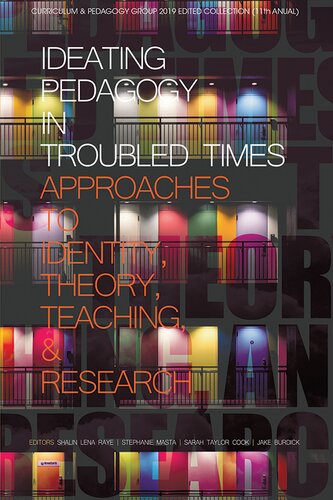Product desciption
Ideating Pedagogy In Troubled Times Approaches To Identity Theory Teaching And Research Shalin Lena Raye by Shalin Lena Raye, Stephanie Masta, Sarah Taylor Cook, Jake Burdick 9781641138642, 9781641138659, 9781641138666, 1641138645, 1641138653, 1641138661 instant download after payment.
We began the call for this book by asking authors to ideate on activism -to take up and seek to extend- the interbraided values from the Curriculum and Pedagogy group's espoused mission and vision, collocating activist ideologies, theoretical traditions, and practical orientations as a means of creatively, reflectively, and productively responding to the increasingly dire social moment. This moment is framed by a landscape denigrated beyond even Pinar's (2004) original declaration of the present-as-nightmare. The current, catastrophic political climate provides challenges and (albeit scant) opportunities for curriculum scholars and workers as we reflect on past and future directions of our field, and grapple with our locations and roles as educators, researchers, practitioners, and beings in the world. These troubled times force us to think critically about our scholarship and pedagogy, our influence on educational practices in multiple registers, and the surrounding communities we claim to serve. This is where the call began: from a desire to think through modern conceptions regarding what counts as activism in the fields of education, curriculum, and pedagogy, and to consider how activist voices and enactments might emerge differently through curriculum and pedagogy writ large. A guiding source of inspiration for this book, weaving among the emerging themes between the collected manuscripts, reflections, and poems, was a passage in Sara Ahmed's (2013) book, The Cultural Politics of Emotion. In this passage, Ahmed works through the complicated relationship between the testimonies of pain that injustice causes, the recognition of this pain, and the potential of these wounds to move us into a different relationship with healing (p. 200). The chapters, reflections, and poems within this volume, thus, effect a collective ideation on how specific cultural politics and deleterious ideological formations – racism, colonialism, homophobia, ableism, to name only a few – persist and mobilize. The authors seek to expose and name some of these injustices, asking readers not only see and hear these experiences, but to inhabit our complicities in their promulgation. It is important to acknowledge that these named social troubles do not exist in isolation, and will enmesh, weave, wind, and entangle with one another. The section headings parallel Ahmed's (2013) own ideations: testimony, recognition, and wounds, not as a formula to follow as an activist call, or as a model for a means to a more just end, but as a way to engage in these issues as a trope of activist confrontation of readers who are, as many of our authors suggest, complicit in maintaining many of these social troubles. The chapters do not need to be read in any particular order, though the ordering of the chapters moves from the naming of social troubles, to showing how teaching, research, and theory ask us to take a more active role in recognizing and acknowledging the prevalence of these issues, and then theorizing ways to engage the wounds.


